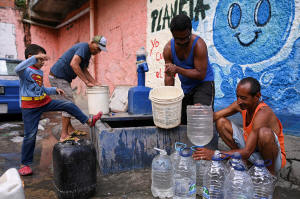With elections coming and relaxed sanctions, Venezuela is set to raise
social spending
 Send a link to a friend
Send a link to a friend
 [November 09, 2023]
By Mayela Armas and Deisy Buitrago [November 09, 2023]
By Mayela Armas and Deisy Buitrago
CARACAS (Reuters) - The Venezuelan government will be in a strong
position to increase social spending to woo voters in 2024 as relief
from some U.S. sanctions allows more oil income to flow into government
coffers, analysts say.
The United States in October temporarily rolled back some oil industry
sanctions and lifted a ban on bond trading sanctions in exchange for an
electoral deal between the government of President Nicolas Maduro and
Venezuela's opposition.
Washington has conditioned an extension of the relief on the release of
political prisoners and what it says are "wrongfully detained"
Americans, as well as the lifting of public office bans on people
including the winner of the opposition's primary nominating contest.
The relaxed sanctions could lead to $1.4 billion in additional income
for Venezuela over the next six months, analyst firm Sintesis Financiera
said in a report.
The additional oil income is expected to arrive gradually, partly though
the redirection of exports. One oil industry source told Reuters they
expect export income to grow by 40% per month.

Under the previous sanctions, state-run oil company PDVSA had to sell to
Asian markets via intermediaries, a strategy that cut into government
profits.
"The increase in income will be gradual," said Jose Vielma, a ruling
party lawmaker and member of the finance committee for the
government-allied national assembly. "The contribution will go to social
spending and services."
The communications ministry and ruling party PSUV did not respond to
requests for further comment on spending plans.
The increased income will almost certainly lead to greater financial
laxity "given the need to improve popular support for the government
ahead of elections in the second half of 2024," said Sintesis Financiera.
The government has traditionally increased social spending, public
sector salaries, food distribution and housing construction projects
ahead of elections, though national income has been limited over the
last five years because of the sanctions and problems at PDVSA.
SALARY INCREASES?
If the sanctions relaxations continue next year and oil production goes
up, the additional income could reach $7 billion in 2024, consulting
firm Ecoanalitica said.
"In electoral periods clientelist spending increases, and it's possible
we'll see workers getting bonuses or improvements in the distribution of
food," said Venezuelan political consultant and analyst Oswaldo Ramirez.
[to top of second column]
|

People extract water from an unknown source in the low-income
neighborhood of Petare, in Caracas, Venezuela May 12, 2023.
REUTERS/Gaby Oraa/File Photo

"The challenge for the government is to convert that into votes...
The ruling party has lost votes in part because of delays in salary
increases and pensions," he said.
The government has already this year launched new social programs -
which it calls "missions" - for young people and women, the first
since 2017.
Such social programs distribute food, houses and even goods like
motorcycle parts, cellphones and computer tablets.
Opposition figures have criticized the missions for more than a
decade, saying they are a poor response to the destruction of
Venezuela's economy by the ruling party, amount to "extortion by
hunger," and that public funds could be better employed raising
public sector salaries and pensions.
Economist Jose Guerra, a former opposition lawmaker and head of the
non-governmental Venezuelan Finance Observatory, said public sector
raises may still be too costly a prospect.
"The government will spend but not at the levels it did before," he
said.
More income may also allow Maduro to revisit orthodox but
insufficient inflation-fighting policies that have led to lower
spending and less availability of credit, even as annual inflation
reaches more than 300%.
Public spending has fallen to 15% of gross domestic product from 40%
a decade ago, according to economic analysts. That has led teachers,
nurses and other public workers to march for higher salaries as
their wages shrink.

Some 2 million public workers earn between $45 and $60 per month,
while private sector salaries are often more than $200, according to
the Venezuelan Finance Observatory.
The central bank should mint fewer bolivares if there is higher oil
income, several analysts said, estimating prices could fall in what
remains of the year and take inflation down to 250% year-on-year.
(Reporting by Mayela Armas and Deisy Buitrago; Writing by Julia
Symmes Cobb; Editing by Rosalba O'Brien)
[© 2023 Thomson Reuters. All rights
reserved.]This material
may not be published, broadcast, rewritten or redistributed.
Thompson Reuters is solely responsible for this content.
 |